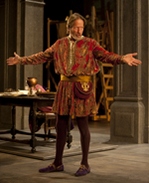SITE GUIDE
SEARCH
REVIEWS
REVIEW ARCHIVES
ADVERTISING AT CURTAINUP
FEATURES
NEWS
Etcetera and
Short Term Listings
LISTINGS
Broadway
Off-Broadway
NYC Restaurants
BOOKS and CDs
OTHER PLACES
Berkshires
London
California
New Jersey
DC
Connecticut
Philadelphia
Elsewhere
QUOTES
TKTS
PLAYWRIGHTS' ALBUMS
LETTERS TO EDITOR
FILM
LINKS
MISCELLANEOUS
Free Updates
Masthead
A CurtainUp Connecticut Review
Divine Rivalry
|
When citizens see your murals, their first thought will be,
'What splendid movement' or 'How they captured the heat of battle.' But when they go beyond the forms, the colors, they'll come to understand the true meaning.
— Machiavelli They will? — Michelangelo Well. . . I'll be there to help, of course. — Machiavelli |

Peter Strauss
(Photo by T. Charles Erickson) |
Piero Soderini (Simon Jones), chief magistrate of the republic, brings news that Florence might fall into the hands of the powerful Medici family and troops from neighboring Pisa, but the council is reluctant to finance local militia. Machiavelli believes a huge mural depicting the past glories of Florence at war will stir up the citizens and convince the council to fund a defense, but getting the mural painted might prove more difficult than he thought.
Both of the artists have more important things to do: Flamboyant DaVinci is busy inventing flying machines while his rival, the pious Michelangelo is answering a higher calling — to sculpt statues for Pope Julius II. Machiavelli persists, however, even as the two trade barbs and seek to outshine the other with each work of art they create.
Finally, to get both artists to work together, Machiavelli presents the project as sort of competition with each given a different wall and subject to paint. Da Vinci concentrates on the horror of battle while Michelangelo, whose recent controversial sculpture of David stands in the hall, focuses on a bath scene with naked soldiers prior to battle.
Kramer uses a good deal of humor to whet the battle of words that Machiavelli, who ponders being remembered throughout history as an adjective, has to referee any time the men come together. That subtle humor makes us smile understandingly -— sort of like the Mona Lisa. It's an intelligent play, with lots of history and multi-layered characters. There isn't much action, though, besides some mixing of paint and a few tense moments when it doesn't dry correctly, the play is fueled by strong performances across the board and ably directed by Michael Wilson.
Wilson leaves his position as artistic director of Hartford Stage at the end of the season, but he has assembled a design team that lets him go out with a bang for his last directorial assignment on this stage. Designer Jeff Cowie's easily changeable, yet large and ornate pieces set the stage for the drama and never let us forget that though the artists and Machiavelli think the everything revolves around their needs and concerns, the world really is a much larger place. The angles of the set are deftly used to place actors at odds, or in allegiance with each other. Projections (Peter Nigrini, design) of the artists' work onto the arched walls give some perspective and David C. Woolard's costumes perfectly visualize the personalities and lifestyles of each of the characters.
|
Divine Rivalry By Michael Kramer Directed by Michael Wilson Cast: Scott Parkinson (Niccolo Machiavelli), Simon Jones (Piero Soderini), Peter Strauss (Leonardo de Vinci), Aaron Krohn (Michaelangelo Buonarroti) Scenic Design: Jeff Cowie Lighting Design: Robert Wierzel Original Music and Sound Design: John Gromada Costume Design: David C. Woolard Projection Design: Peter Nigrini Wig Design: Paul Huntley Running time: 2 hours with a 15-minute intermission Hartford Stage, 50 Church St., Hartford, CT Performances: Tuesdays, Wednesdays, Thursdays, Sundays at 7:30 pm; Fridays, Saturdays at 8 pm; Matinee performances are Sundays and selected Wednesday at 2 pm Tickets: Available by calling 860- 527-5151 or at www.hartfordstage.org Feb. 24-March 20, 2011 Review by Lauren Yarger based on performance of March 2, 2011 |
|
Subscribe to our FREE email updates with a note from editor Elyse Sommer about additions to the website -- with main page hot links to the latest features posted at our numerous locations. To subscribe,
E-mail:
 esommer@curtainup.comesommer@curtainup.com esommer@curtainup.comesommer@curtainup.comput SUBSCRIBE CURTAINUP EMAIL UPDATE in the subject line and your full name and email address in the body of the message -- if you can spare a minute, tell us how you came to CurtainUp and from what part of the country. Visit Curtainup's Blog Annex Curtainup at Facebook . . . Curtainup at Twitter REVIEW FEEDBACK Highlight one of the responses below and click "copy" or"CTRL+C"
Paste the highlighted text into the subject line (CTRL+ V): Feel free to add detailed comments in the body of the email. . .also the names and emails of any friends to whom you'd like us to forward a copy of this review. |





